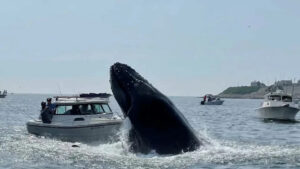
VIDEO: Dangerous sea-life encounters increase as ocean ‘fights back’

As temperatures rise and more people head to the coast to cool down, there has been concern in the US about the increased number of encounters between swimmers, surfers and boaters with sharks, seals and whales.
Rockaway Beach in Long Island, New York, was recently shut down to swimmers after a string of shark sightings over the past few weeks. In the past three weeks, six individuals reportedly suffered non-life-threatening injuries from shark bites near Long Island beaches.
In response, state agencies enhanced shark monitoring, including the use of drone and helicopter monitoring. The beach reopened on 24 July.
Experts have said that the spate of Long Island shark attacks could be explained by a shark nursery just off the coast, with people disrupting a school of bait fish they feed on.
Last weekend in Hawaii, a 60-year-old woman swimming in a fenced-off area at a beach in Waikiki was injured, after encountering an endangered Hawaiian monk seal. Footage of the incident shows the mother seal charging at the woman while she was in the water, as the seal defended its young pup.
TOO CLOSE: A woman was apparently bit by a monk seal while swimming in Waikiki Sunday morning.
— Hawaii News Now (@HawaiiNewsNow) July 24, 2022
Signs and rope barriers have been up at Kaimana Beach ever since monk seal mother Rocky gave birth to a pup there in early July.
(Thread 1/2) pic.twitter.com/JuNhWp7lJM
After the incident, Hawaii Marine Animal Response told media that it had been monitoring the pup and continued to warn all swimmers to keep at least 150 feet from mother seals.
On Sunday (24 July), a humpback whale was caught on camera as it hit a fishing boat in Plymouth, Massachusetts. Footage of the close call shows the whale breaching before landing on the front of the boat, causing it to rock heavily. No injuries were reported in the incident.
Plymouth Harbormaster Chad Hunter told NBC10 Boston that: “The boat was in the right place at the wrong time. This could have been much worse for all involved.”
“[The whale] all of a sudden, full breach, ten feet out of the water, slams on top of his guy’s boat.” https://t.co/3DkDVI60a6 pic.twitter.com/GhdyKLTmno
— NBC4 Washington (@nbcwashington) July 25, 2022
The breach is just one of several encounters with whales over the past couple of weeks. NBC Boston reports there was also close contact with a paddleboarder and a whale bumped into a boat in a similar location last week.
In response to the worrying trend, The National Oceanic and Atmospheric Administration (NOAA) is to give an update later today (29 Jul) to explain that whales are in the area looking for food, and how boaters can safely view them. Signs have already gone up advising boaters to keep 100 feet away from whales.
Thank you to @MassDCR and @MAEnviroPolice for installing a sign at the @Plymouth_Harbor boat ramp to help spread a safety message about boating near whales. pic.twitter.com/0etQEZcseq
— PlymouthHarbormaster (@Plymouth_Harbor) July 28, 2022
A slew of shark encounters have been reported on both coasts in July. Sharks have been filmed swimming just metres from the beach in Alabama and South Carolina, while surfers were filmed paddling away from a large shark in California. Earlier this month, a 15-year-old girl lost her leg after being attacked by a shark while she was scalloping in five-foot-deep water near Grassy Island in Florida.
Despite the recent spate of encounters, shark attacks on humans remain extremely rare. It’s considered safest to avoid swimming at dawn or dusk, and to always remove jewellery before entering the water, as reflections can simulate fish scales and attract the interest of predators.
Gavin Naylor, director of the Florida Program for Shark Research at the University of Florida in Gainesville, tells CNN that globally, shark attacks are at similar levels to previous years, and that the sharks have been seeking out food, not targeting humans.
“We are right on trend for this time of year. I think globally, we usually get between 70 and 80 unprovoked bites by sharks around the world. But that’s a global phenomenon. And it’s distributed in a patchy way,” Naylor says.
“One year we might have two or three bites in Hawaii in rapid succession. Next year, it could be New Caledonia; it could be in Western Australia. And this year, it’s off the coast of Long Island.”
